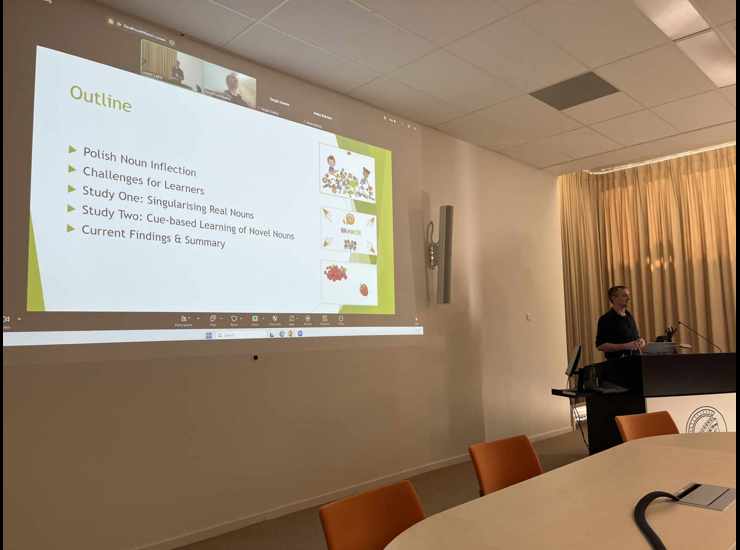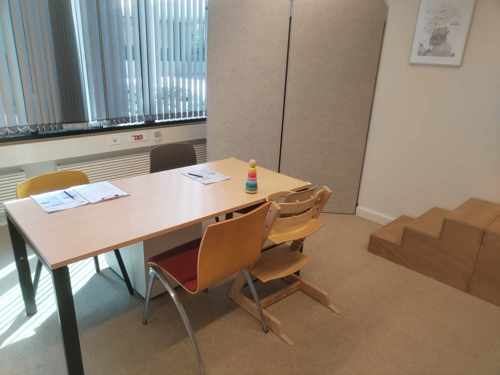
In an unseasonably sunny April 2025, I had the pleasure of spending a week at the Max Planck Institute for Psycholinguistics (MPI) at Nijmegen in the Netherlands, thanks to a kind LuCiD Travel Award.
MPI Nijmegen is home to a multinational group of PhD researchers, post-docs and research assistants, led by Prof. Caroline Rowland. The team tackle all sorts of language-processing questions. Being a part-time PhD student (with a family and full-time job to boot!), it was great to take a solid week out and immerse myself in this fascinating environment. Here are some of things I got up to, and my reflections on what I have taken away from the visit.
From the first couple of hours after arrival on Monday morning, I’d already noticed three things: the quality of the facilities, the enthusiasm and friendliness of the people, and the diversity of research interests. As a lover of all things language – hey, you have to really love your subject to embark on a PhD in it, right? – it was so exciting to meet people passionately interested in such a diverse range of areas related to language learning and processing. To give a flavour of the conversations we had, here are some of the areas the team was examining at the time:
- Bilingualism: Exploring Dutch-German children’s processing of overheard sequences of word pairs using eye-tracking software to observe when they ‘notice’ semantic dissimilarity (e.g. apple-pear vs. apple-chair) and how the language of the word affects this behaviour. (i.e. Dutch ‘apple’ followed by Dutch ‘pear’, German ‘apple’ followed by Dutch ‘chair’ – all combinations and orders!)
- Under-researched languages: Universal theories about language learning sometimes have a harder time holding true if they are based primarily on certain languages (like English!) or language groups (like Indo-European languages). For example, it is well researched that infants begin to segment the stream of noise they hear into separate words by identifying patterns in the sounds: which consonants sounds tend to cluster together, and which don’t. (e.g. English words don’t start with tk-, but in other languages they do). However, what’s interesting in Berber languages, spoken in North Africa, is that it’s a phonological free-for-all: any consonant cluster goes! So how do Berber-learning children manage to segment the speech stream? One researcher I met from Morocco was just starting his PhD examining his native variant of Berber to find out. He was developing a brand-new corpus of child-directed speech in his language and analysing waveforms that he showed me. It was so fascinating!
- Other diverse language questions: How do child learners of Mayan process sentences? How do Mandarin Chinese children acquire the tonal system? How do German-speaking kids use case marking of articles to work out what’s the agent (the ‘doer’) and patient (the object directly affected) in a sentence? (Clue: 2-year-olds haven’t worked out the distinction yet.)
- Sign Languages: Because theories of language learning need to be able to account for signed languages too, one researcher travelled around the Netherlands to examine child learners of Dutch Sign Language. Her interest was the role of peripheral vision in maintaining joint attention to both the sign for an object and the object itself, as part of the learning process.
- Language impairments: I met one person who was researching children with Developmental Language Disorder (DLD) in her native USA, and another who was developing a clinical diagnostic tool for Aphasia intended for Dutch users who experience difficulty formulating speech.
These conversations took place across the whole week. But on the Monday afternoon, I had an opportunity to present to the team about my own PhD research, and get some valuable comments, feedback and insights from them about it. In short, my research is about how Polish children learn how nouns inflect – this usually involves the changing of the ending of a word – according to properties such as gender, class, phonology, number and the grammatical case that the word is being used in. As a non-native speaker of the language, I can confirm that the answer is somewhat complex and occasionally quite messy!
It was really fun to be able to share the findings of my completed Study One (tagline: the statistical biases of certain noun forms over other noun forms affect learning, and in some cases this can lead learners to inflect incorrectly). I also hugely appreciated the Q&A about my ongoing Study Two, which tests how Poles (both adults and kids) learn the grammar of made-up nouns: I’d reached a bit of a methodological quandary following the adult data collection, and wanted to seek thoughts on how best to design to child stage. I pitched the ideas I’d discussed with my supervisors, and really valued hearing the ideas and suggestions from the group. It was also a good confidence-booster for me, as a newbie to presenting my research and trying to field questions!
One other thing I found enriching about the week was the facilities themselves. The welcoming Fairy Walk that child participants go along with their adult upon arrival was great! In the labs themselves the eye-tracking equipment, like that used for the bilingual study mentioned above, was also very intriguing to check out. I also acted as a guinea pig for the Bayley Test that kids take part in, consisting of tasks involving various props to assess development of cognitive processing, language and motor skills. One thing I didn’t see personally but sounded incredible was an AI-powered device worn by children that observes and listens to the child’s entire surroundings, integrating auditory and visual information into a massive corpus of holistic data (which would take decades to process without AI), ready for all sorts of analysis. One Swiss chap was using this to study Dutch children’s development.

Finally, a French PhD researcher from a nearby department came over to talk about their computational modelling work. She showed me a fascinating diagram of a network that they use to represent regions of the brain and the different neurological processing stages involved in everything from speech perception, to comprehension, to speech planning and production. The bit her research focused on was the neuropathways involved in producing individual syllables as part of speech production. The bit that resonated with my research area was the processing of lemmas and morphemes that underpin inflectional morphology. Food for thought for my possible Study Three!
So, as you can see, a lot of cutting-edge research going on! Add to that the specialist library, and a lovely airy eating and sitting area with modern interior design, and you’ve got an awesome facility. They even lent me a bike for the week so I could do as the Dutch do, and bike to work! It was also a lovely forest route back to my accommodation, though the last part was unusually steep for the Netherlands!

All in all, it was an excellent week. I really appreciate the time given by busy researchers to talk with me about their and my research, and the welcoming and inclusive atmosphere of the whole place. Ilse, Executive Secretary to the Director, helped me out with all sorts of things before and during the visit, and as another non-native Polish speaker with personal connections to the country, she was great to chat to. Dziękuję!
I also pay special thanks to the Director herself, Caroline Rowland, for inspirational conversations about life in research alongside family demands and less-traditional paths in academia. Her own experiences and reflections resonated with me as someone taking a PhD a bit later in life, with a young family and full-time job that together occupy an enormous amount of headspace! Her story, and the whole week at MPI, reminded me that if you have a passion for a subject – like I do for languages and learning – don’t let anything stop you from pursuing it.

